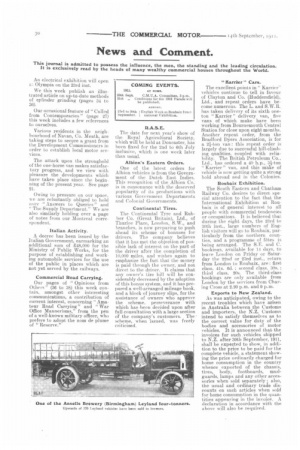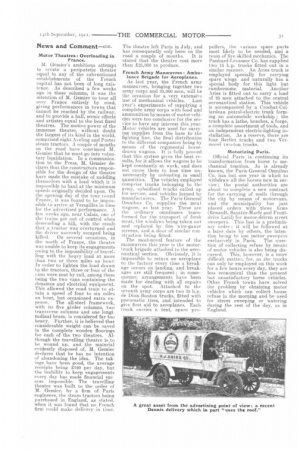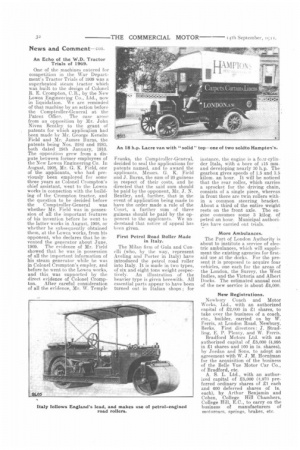News and Comment.
Page 10

Page 11

Page 12

If you've noticed an error in this article please click here to report it so we can fix it.
This journal is admitted to possess the influence, the men, the standing and the leading circulation. It is exclusively read by the heads of many wealthy commercial houses throughout the World.
An electrical exhibition will open ar, Olympia on the 23rd inst.
We this week publish an illustrated article on up-to-date methods of cylinder grinding (pages 34 to 36).
Our occasional feature of " Culled from Contemporaries (page 27) this week includes a few references to ourselves.
Various residents in the neighbourhood of Navan, Co. Meath, are taking steps to secnre a grant from the Development Commissioners in order to establish local motor services.
The attack upon the stronghold of the one-horse van makes satisfactory progress, and we view with pleasure the developments which have taken place since the beginning of the present year. See page 21.
Owing to pressure on our space, we are reluctantly obliged to hold over "Answers to Queries" and The Supply Department." We are also similarly holding over a page of notes from our Montreal correspondent.
Italian Activity.
A decree has been issued by the Italian Government, earmarking an additional sum of £48,000 for the Ministry of Public Works, for the purpose of establishing and working automobile services for the use of the public in places which are not yet served by the railways.
Commercial Road Carrying.
Our pages of "Opinions from Others" (36 to 38) this week contain, amongst other interesting communications, a contribution of current interest, concerning "Amateur • Road Carrying" and "War Office Mannerisms," from the pen of a well-known military officer, who prefers to adopt the nom de plume of "Reserve,"
R.A.S.E.
The date for next year's show of the Royal Agricultural Society, which will be held at Doncaster, has been fixed for the 2nd to 6th July inclusive, which is one week later than usual.
Albion's Eastern Orders.
One of the latest orders for Albion vehicles is from the Government of the Dutch East Indies. This recognition of the Albion Co. is in consonance with the deserved popularity of its productions with various Government Departments and Colonial Governments.
Cont mental Tires.
The Continental Tyre and Rubber Co. (Great Britain), Ltd., of Thurloe Place, London, S.W., and branches, is now preparing to push ahead its scheme of bonuses for drivers. The company believes that it has met the objection of possible lack of interest on the part of the driver after the completion of 10,000 miles, and wishes again to emphasize the fact, that the money is paid through the owner, and not direct to the driver. It claims that any owner's tire bill will be considerably decreased by the adoption of this bonus system, and it has prepared a well-arranged mileage book, and a block of journey slips, for the assistance of owners who approve the scheme, perseverance with which has-been decided upon after full consultation with a large section of the company's customers. The scheme, when issued, was freely criticised. "Barrier " Cars.
The excellent points in " Ranier' vehicles continue to tell in favour of Clayton and Co. (Huddersfield), Ltd., and repeat orders have become numerous. The L. and S.W.R. has taken delivery of its sixth oneton " Karrier " delivery van, five vans, of which make have been working from Bournemouth Central Station for close upon eight months, Another repeat order, from the Bradford Dyers Association, is for a 221-ton van: this repeat order is largely due to successful hill-climbing qualities, coupled with reliability. The British Petroleum Co,, Ltd., has ordered a 40 h.p., 3A-ton " Karrier " van, and this make of vehicle is now getting quite a strong hold abroad and in the Colonies.
Roubaix Exhibition.
The South Eastern and Chatham Railway Co. desires to direct special attention to the fact that the International Exhibition at Roubaix is of general interest to all people with commercial tendencies or occupations. It is believed that during the eight days, the 23rd to 30th inst., large numbers of Eng
lish visitors will go to Roubaix, particularly from the northern coun ties, and a programme of fetes is being arranged. The S.E. and C. bookings, available for 11 days, to leave London on Friday or Saturday the 22nd or 23rd inst., return from London to Roubaix. are : first class, 41s. 6d. ; second class. 30s. ; third class. 20s. The third-class bookings are only available from London by the services from Charing Cross at 2.20 p.m. and 9 p.m.
Exports to New Zealand.
As was anticipated., owing to the recent troubles which have arisen in ,Australia between the Customs and importers, the N.Z. Customs intend to satisfy themselves as to the correct value for duty of the bodies and accessories of motor vehicles. It is announced that the invoices for such . vehicles shipped to N.Z. after 30th September, 1911, shall be expected to show, in addition to the price to be paid for the complete vehicle, a statement showing the price ordinarily charged for home consumption in the country whence exported of the chassis, tires, body, footboards, mudguards, lamps and any other accessories when sold separately : also, the usual and ordinary trade discounts on such articles when sold for home consumption in the quantities appearing in the invoice. A declaration in accordance with the above will also be required.
Motor Theatres : Overloading in France.
M. Glemier's ambitious attempt to create a peripatetic theatre equal to any of the subventioned establishments of the French capital has not been of long existence. As described a few weeks ago in these columns, it was the intention of M. Gemier to tour all over France entirely by road, giving performances in towns that cannot be reached by the railway, and to provide a hall, scenic effects and artistes equal to the best fixed theatres. The motive power of the immense theatre, without doubt the largest of its kind in the world, comprised eight Aveling and Porter steam tractors. A couple of months on the road have convinced M. Gemier that. he must go into voluntary liquidation. In a commurncation to the Press, M. Gemier declares that the constructors responsible for the design of the theatre have made the mistake of saddling themselves with a load which it is impossible to haul at the minimum speeds originally decided upon. On the opening day of the tour iound France, it was found to be impossible to arrive at Versailles in time for the advertised performance. few v■ eeks ago, near Calais, one of the trains got out of control when descending a hill, with the result that a tractor was overturned and the driver narrowly escaped being
killed. On several occasions, in the north of France, the theatre was unable to keep its engagements owing to the impossibility of travelling with the heavy load at more than two or three miles an hour: In order to lighten the load drawn by the tractors, three or four of the vans were sent by rail, among them being the two vans containing the dynamos and electrical equipment. This allowed the road train to .attain a speed of four to six miles an hour, but occasioned extra expense. The all-steel framework, with its five girder columns, two transverse columns and one longitudinal beam, is considered far too heavy. Further, it is believed that considerable weight can be saved in the complete wooden floorings for each of the two theatres.Although the travelling theatre is to be wound up, and the material evidently disposed of, M. Gemier declares that he has no intention of abandoning the idea. The takings have been good, the average receipts being £120 per day, but the inability to keep engagements every day has made financial success impossible. The travelling theatre was built to the order of M. Cremier, by a firm of Paris engineers, the steam tractors being purchased in England, as stated. when it was found that no French firm could make delivery in time.
The theatre left Paris in July, and has consequently only been on the road a couple of months. It is stated that the theatre cost more than 2.25,000 to produce.
French Army Manoeuvres: Ambu lance Brigade for Aeroplanes.
As last year, the French army manceuvres, bringing together two army corps and 35,000 men, will be the occasion for a very extensive use of mechanical vehicles.Last year's experiments of supplying a complete army corps with food and ammunition by means of motor vehicles were too conclusive for the service to have any interest this year. Motor vehicles are used for carrying supplies from the base to the fighting line, the final distribution to the different companies being by means of the regimental horsedrawn wagons. It is fully proved that this system gives the best results, for it allows the wagons to be kept constantly at work, and does not cause them to lose time unnecessarily by unloading in small quantities. The vehicles employed comprise trucks belonging to the army, subsidised trucks called up for service, and vehicles loaned by manufacturers. The Paris General Omnibus Co. supplies the meat wagons, as last year. These are the ordinary omnibuses transformed for the transport of fresh meat, the windows being taken out and replaced by fine wire-gauze screens, and a door of similar construction being fitted.
The most-novel feature of the manceuvres this year is the motortruck brigade attached to the aero
nautical section. Obviously, it is impossible to return an aeroplane to the factory every time a breakage occurs on landing, and breakages are still frequent ; in consequence, arrangements have been made for dealing with all repairs on the spot.. Attached to the seventh army corps are two 35 h.p.
Dion-Bouton trucks, fitted with pneumatic tires, and intended to give first aid to aeroplanes. Each truck carries a tent, spare pro peilers, the various spare parts most likely to be needed, and a team of five skilled mechanics. The Panhard-Le.vassor Co. has supplied two 15 h.p. trucks fitted out in a similar manner. An Aries truck is employed specially for carrying spare wings and naturally has a special body for this light but cumbersome material. Another Aries is fitted out to carry a load of 25 men attached to the central aeronautical station. This vehicle is accompanied by a Crochat-Collardeau petrol-electric truck forming an automobile workship ; the truck has a lathe, benches, a forge, a complete assortment of tools, and an independent electric-lighting installation. As a reserve, there are four Berliet trucks and two Vermorel two-ton trucks.
Motorizing Paris.
Official Paris is continuing its transformation from horse to mechanical traction. As is already known, the Paris General Omnibus Co. has but one year in which to withdraw all the horses now in service; the postal authorities are about to complete a new contract for the carrying of mails through the city by means of motorvans, and the municipality has just placed orders with three firms (Henault, Sautter-Harle and Frontdrive Latil) for motor-driven street sweepers. This last. is a preliminary order it will be followed at a later date by others, the intention being to use motor sweepers
exclusively in Paris. The question of collecting refuse by means of motor vehicles is also being discussed. This, however, is a more difficult matter, for, as the trucks can only be employed on this work for a few hours every day, they are less economical than the present but unsatisfactory horse vehicles. Other French towns have solved the problem by obtaining motor vehicles which can collect house refuse in the morning and be used for street sweeping or watering during the rest of the day, as in England.
An Echo of the W.D. Tractor Trials of 1909.
One of the machines entered for competition in the War Department's Tractor Trials of 1909 was a superheated steam tractor which was built to the design of Colonel R. E. Crompton, C.B., by the New Lowca Engineering Co., • Ltd., now in liquidation. We are reminded of that machine by an action before the Comptroller-General at the Patent Office. The case arose from an opposition by Mr. John Niven Bentley to the grant of patents for which application had been made by Mr. George Kenelin Field and Mr. James Burns, the patents being Nos. 2282 and 2283, both dated 29th January, 1910. The opposition grew from a dispute between former employees of the New Lowca Engineering Co. In August, 1908, Mr. G. K. Field, one of the applicants, who had previously been employed for some three years as Colonel Crompton's chief assistant, went to the Lowca works in connection with the building of the Crompton tractor, and the question to be decided before the Comptroller-General was whether Mr. Field was in possession of all the important features of his invention before he went to the latter works in August, 1908, or whether he subsequently obtained them, at the Lowca works, from his opponent, who declares that he invented the generator about June. 1909. The evidence of Mr. Field showed that he was in possession of all the important information of his steam generator while he was in Colonel Crompton's employ, and before he went to the Lowca works, and this was supported by the direct evidence of Colonel Cromp
ton. After careful consideration of all the evidence, Mr. W. Temple Franks, the Comptroller-General, decided to seal the applications for patents named, and to award the applicants, Messrs. G. K. Field and J. Burns, the sum of 20 guineas in respect of their costs, and he directed that the said sum should be paid by the opponent, Mr. J. N. Bentley, and, further, that in the event of application being made to have the order made a rule of the Court, a further sum of three guineas should be paid by the opponent to the applicants. We understand that notice of appeal has been given.
First Petrol Road Roller Made in Italy.
The Milan firm of Cola and Conelli (who, by the way, represent Aveling and Porter in Italy) have introduced the petrol road roller into Italy. It is made in two types, of six and eight tons weight respectively. An illustration of the heavier type is given herewith. All essential parts appear to have been turned out in Italian shops ; for instance, the engine is a for-cylinder Itala, with a bore of 115 ram. and developing nearly 30 h.p. The gearbox gives speeds of 1.5 and 3.5 kilom. an hour. It will be noticed that the rear roller, which carries a sprocket for the driving chain, consists of a single piece, whereas in front there are twin rollers within a common steering bracket. About a third of the entire weight rests on the front axle. The engine consumes some 3 kilog. of petrol an hour. Municipal authorities have carried out trials.
More Ambulances.
The Port of London Authority is about to institute a service of electric ambulances, which will supplement the existing agencies for firstaid use at the docks. For the present it is proposed to acquire four vehicles, one each for the areas of the London, the Surrey, the West Indies, and the Victoria and Albert Docks. The estimated annual cost of the new service is about £4,000.
New Registrations.
Newbury Coach and Motor Works, Ltd., with an authorized capital of £2,000 in El shares, to take over the business of a coach, etc., builder, carried on by W. Ferris, at London Road, Newbury. Berks. First. directors : J. Stradling, E. P. Plenty, and W. Ferris.
Bradford Motors Ltd. with an authorized capital of £5,000 (4,995 in El shares and 100 in Is. shares), by Jordan and Sons, to adopt an agreement with W. J. M. Horniman for the acquisition of the business of the Belle Vue Motor Car Co., of Bradford, etc.
A. S. L. Ltd., with an authorized capital of 25,000 (4,970 preferred ordinary shares of .£1 each and 600 deferred shares of Is. each), by Arthur Benjamin and Cohen, College Hill Chambers, College Hill, EC, to carry on the business of manufacturers of motorcars, springs, brakes, etc.




















